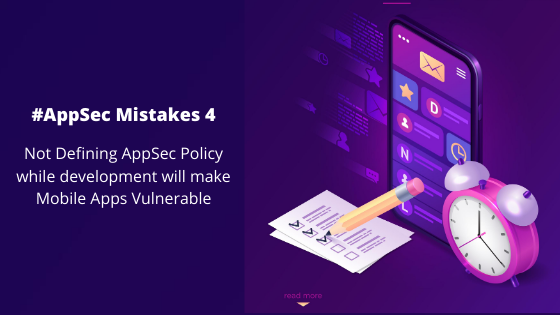You have developers working round the clock to deliver timely products who put to use the latest technology to develop exquisite products. But, what good does it hold if they do not adhere to a robust AppSec policy? Sooner or later, they will be vulnerable to security threats from hackers and rendered incompetent against the relentless onslaught. Hence, the importance of having an AppSec policy that prioritizes attending to critical app security flaws cannot be overstated. Adopting this approach saves time, and provides developers with adequate bandwidth to handle burning issues first and reinforce application security quickly.
A robust development methodology should improve performance as well as push application protection to the next level. An appropriately crafted AppSec policy ensures both these aspects in equal measure without compromising on any of them. DevOps and agile frameworks have fundamentally changed the way code is deployed and released. The AppSec policies should complement this approach by facilitating developers to “get the good code out quickly” by integrating the security element in DevOps seamlessly. Setting achievable targets could be a good starting point, ramping them up as and when they are achieved. This approach does well to build a sustainable, developer-friendly security apparatus, especially while implementing new AppSec policies with a novice security team.
Strong AppSec policies, thus, bring clarity and preciseness in dealing with security flaws. Determining which of them are critical and need immediate attention, and which ones to ignore/put up for the future can save the team loads of time and improve efficiency markedly. Notably, a pragmatic AppSec policy is the need of the hour, aligning its goals with business objectives and contributing towards the development of secure product releases within the stipulated time frame and budget.
An intelligent policy should keep pace with time and be rigid yet flexible enough to accommodate legitimate developer concerns. In line with the business portfolio, the AppSec policy should incorporate guidelines, regulations, and customer impact. These policies should facilitate the DevOps framework rather than inhibit it.
Right-sizing policies enable quicker adoption of AppSec methodologies by the development team. For example, requiring penetration testing at the end of each product release in case of projects that have tight deadlines may not be a recommended option; instead, the development should opt for static automated testing as part of a daily schedule to identify critical flaws. Other assessments, like dynamic application security testing (DAST) and composition analysis, can be adopted based on the requirement of the application. This methodology should vary according to apps complexity, whether third-party components are in use, “business-critical” quotient of the application, and delivery timelines.
AppSec policies often contain jargon and verbose language open for interpretation. Preparing a precise and unambiguous AppSec policy is one of the crucial ways to enforce its implementation. At the same time, it should be an organic document that can evolve over time, as the team starts building secure code through regular training with the help of AppSec experts.
A well-crafted AppSec policy establishes a governance framework to monitor the robustness of the application. The policy should establish metrics outlining what the development team is planning to accomplish. For example, the team could validate an application for OWASP mobile Top 10 issues by identifying the flaws, remediate and remove those vulnerabilities, and then check for the flaws in subsequent releases. Identifying critical vulnerabilities and redressing them before they cause the intended damage reduces the application exposure risk and rework needed to update it. This holds the AppSec implementation in good stead. Without a policy, the development team remains in muddy waters about whether it is moving in the right direction and whether the security initiatives have produced the intended results.
AppSealing can provide you the right platform in implementing robust AppSec policies, customized according to your business portfolio and offerings. Contact us today and prevent yourself from falling prey to one of those common AppSec pitfalls.






